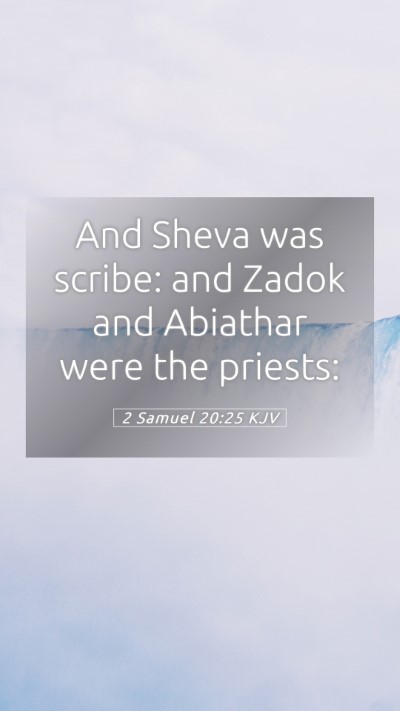Understanding 2 Samuel 20:25
The verse 2 Samuel 20:25 states: "And Sheba had a name, and he was a man of no account. And Joab said to the people: 'We know him not; let him go in peace.'" This portion of Scripture reveals various dimensions regarding leadership, accountability, and the dynamics of authority within the context of David's reign.
Bible Verse Meaning
This passage encapsulates the actions of Joab, one of David's military leaders, as he deals with Sheba, a man who rebelled against King David. Understanding the meaning of this Bible verse requires an exploration of several elements:
- Context of Rebellion: Sheba's act of rebellion against King David signifies a larger narrative of discontent that existed within the kingdom, often leading to civil unrest.
- Joab's Leadership: Joab, known for his ruthlessness, emphasizes not pursuing Sheba, showcasing a moment of discernment in leadership.
- Theological Implications: The passage serves as a reminder of the importance of accountability in leadership and the consequences of rebellion against divinely appointed authority.
Bible Verse Interpretations
According to Matthew Henry, Joab’s leadership is characterized by a mix of brutal decisiveness and strategic mercy. He understood that pursuing Sheba could lead to unnecessary bloodshed and could bring further division among the people.
Albert Barnes notes that the reference to Sheba as “a man of no account” signifies the insignificance of his rebellion when compared to the greater priorities of national unity and peace. This highlights the idea that not all offenses require a severe response.
Adam Clarke further interprets Joab's remark as an indication of pragmatic leadership; choosing to let Sheba go is not only a tactical move but also an example of wisdom in knowing when to act and when to show restraint.
Bible Study Insights
This verse is rich in insights applicable to modern readers, particularly in understanding how to interpret Bible verses in light of leadership, conflict resolution, and authority dynamics:
- Leadership Dynamics: One can learn the importance of wise leadership that balances accountability with mercy.
- Conflict Resolution: The incident encourages leaders to prioritize the peace and unity of the larger community over individual grievances.
- Accountability: It serves as a reflection on the necessity of accountability for all, particularly those in positions of influence.
Scripture Analysis
Examining this verse through historical context helps in understanding the turmoil within the kingdom after Absalom's rebellion. The dynamics between Joab, King David, and Sheba represent the struggles inherent in leadership and governance:
- David's Leadership: The aftermath of Absalom's revolt and Sheba's rebellion illustrates the challenges facing David as a ruler.
- Social Order: Acknowledging the necessity of maintaining social order amongst the people becomes evident.
- Moral Responsibility: The actions taken (or not taken) by Joab raise questions about moral responsibility in times of crisis.
Application of Bible Verse
Understanding Scripture such as 2 Samuel 20:25 encourages individuals and communities to reflect on how they handle conflict and leadership:
- Personal Reflection: Consider how one responds to challenges in authority, and the importance of evaluating situations wisely.
- Community Engagement: Engage in discussions within Bible study groups about the balance of justice and mercy in community leadership.
- Leadership Development: Use this passage to discuss leadership principles in modern contexts, emphasizing the importance of discernment.
Cross References
Key Biblical passages that relate to 2 Samuel 20:25 include:
- 2 Samuel 15:2-6: The rise of rebellion during Absalom’s time.
- Proverbs 11:14: Importance of wise counsel in leadership.
- Romans 13:1: Authority established by God and the responsibilities of both leaders and followers.


